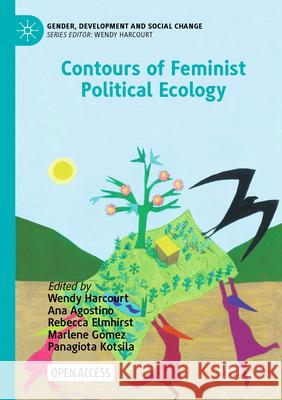Contours of Feminist Political Ecology » książka
Contours of Feminist Political Ecology
ISBN-13: 9783031209307 / Angielski / Miękka / 2023 / 245 str.
Contours of Feminist Political Ecology
ISBN-13: 9783031209307 / Angielski / Miękka / 2023 / 245 str.
(netto: 153,32 VAT: 5%)
Najniższa cena z 30 dni: 154,18
ok. 16-18 dni roboczych.
Darmowa dostawa!
This open access book sets out the contours of feminist political ecology (FPE) as a major contribution to ongoing debates in the field. As Professor Lyla Mehta says in her Foreword, the book is "foregrounding multiple ways of knowing and being, thus enabling new conceptions of politics, justice and alternatives to dominant, capitalist development trajectories". In an innovative methodological twist, the edited book engages the reader in conversations that have emerged from the multi-sited and cross-generational dialogues of the Well-Being Ecology Gender cOmmunities (WEGO) network over the last four years. The conversations explore topics that range from climate change and extractivism, to body politics and health, degrowth, care and community well-being. The authors reflect on their collective learning process as they map out the new directions of FPE research and analysis. The chapters highlight WEGO transnational/transdisciplinary conversations with local communities, social movements and different academic spaces. The book foregrounds the ethics of doing feminist work inside and outside academe and brings to life the importance of doing reflexive research aware of situated historical and contemporary geographical contours of power.
This open access book sets out the contours of feminist political ecology (FPE) as a major contribution to ongoing debates in the field. As Professor Lyla Mehta says in her Foreword, the book is "foregrounding multiple ways of knowing and being, thus enabling new conceptions of politics, justice and alternatives to dominant, capitalist development trajectories". In an innovative methodological twist, the edited book engages the reader in conversations that have emerged from the multi-sited and cross-generational dialogues of the Well-Being Ecology Gender cOmmunities (WEGO) network over the last four years. The conversations explore topics that range from climate change and extractivism, to body politics and health, degrowth, care and community well-being. The authors reflect on their collective learning process as they map out the new directions of FPE research and analysis. The chapters highlight WEGO transnational/transdisciplinary conversations with local communities, social movements and different academic spaces. The book foregrounds the ethics of doing feminist work inside and outside academe and brings to life the importance of doing reflexive research aware of situated historical and contemporary geographical contours of power.











